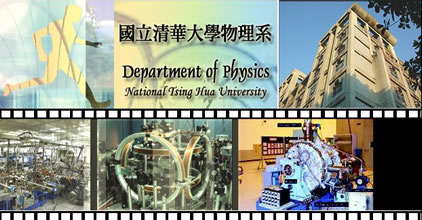General Physics Lab
| Content | |
|---|---|
| Calender | Fall 2024 Course Schedule |
| EXP | |
| EXP 1 | Measuring |
| EXP 2 | Newton's Second Law |
| EXP 3 | Centripetal Force |
| EXP 4 | Demonstrations A |
| EXP 5 | Rotational Motion |
| EXP 6 | Collision |
| EXP 7 | Standing Waves |
| EXP 8 | Demonstrations B |
| EXP 9 | Simple Harmonic Motion |
| EXP 10 | Thermodynamics |
| EXP 11 | Demonstrattions C |
| EXP 13 | The Ammeter, Voltmeter and Ohmmeter |
| EXP 14 | The Current Balance |
| EXP 15 | Digital Oscilloscope |
| EXP 16 | Demonstrations D |
| EXP 17 | The Electric Field |
| EXP 18 | Optical Experiment |
| EXP 19 | RC and RLC Circuits |
| EXP 20 | Demonstrations E |
| EXP 21 | Helmholtz Coils |
| EXP 22 | Michelson interferometer |
| EXP 23 | Atomic spectrum and Planck constant |
| EXP 24 | Demonstrations F |
Syllabus of General Physics Laboratory
In this course, students will prove the theorems learned in physics class. The course trains students’ abilities to take measurements, operate equipment, solve the problems encountered while conducting experiments and analyze data.
For fall semester, the labs are focusing on basic measurements, motion, physical mechanics, thermodynamics, and mechanical waves. For spring semester, we will focus on electricity, magnetic, electromagnetism, functions of basic electronic equipment, electric circuits, and optics. By conducting the experiments, we want to train students’ attentive attitude and their curiosity toward experiments, familiarizing students with basic measuring equipment. In addition, we schedule demonstration experiments for the experiments that do not allow all students to do, in order to provide more contents in the course. We may have opportunities to invite physicians to the class to give speeches and for students to learn from other schools. We may as well schedule a trip out of school to a science museum.
Course goal:
- To prove and to learn the basic physics theorems.
- Be familiar with the measuring equipment and know how to use them
- Strengthen basic abilities.
- Learn how to analyze data. Strengthen students’ ability of using scientific calculators and EXCEL.
- Train students to write a report, especially writing, graphing, and presenting skills. Learn how to use Word and Power Point.
- Strengthen students’ understanding of basic physics theorems.
- Train students’ ability to find questions, solve problems, and use creativity.
- Train students’ curiosity and attentive attitude toward conducting experiments, focusing on group work and cooperation.
Course contents:
There are 4 types of teaching methods – laboratory explanation, hand-on labs, demonstration experiments, and videos. The schedule for each class is planned by general physics lab crew. For the fall semester of this year, the schedule will be posted on http://www.phys.nthu.edu.tw/~gplab/.
Conducting the experiment:
- While conducting the experiment, students will be in a group of two (or three, when the class has more than sixty students).
- When conducting the experiment, students have to bring their calculators and draft paper with them. It is highly recommended for students to bring digital cameras to record the experiments.
- Each student will have to write his or her own pre-lab report, final report, and any kind of report.
- Before the lab, students will need to hand in the pre-lab report for the week and final report for last week’s lab.
- The lecturer and TAs can give quizzes in class on the lab.
- Before leaving, students must roughly analyze the data and draw the graph. The data and graph should be checked by the TAs or the lecturer and signed before students leave.
- Data retrieved from the lab should be analyzed and graphed by EXCEL or any related analytic software.
- Final exam will be hands-on experiment and paper exam.
Grading criteria:
- Report grade: Including pre-lab reports, final reports, demonstration experiment reports, and reports on video watching. There will be eleven reports in a semester. The reports will account for at least 60% of the final grade.
- Attitude.
- Paper tests:Including preview quizzes, in class quizzes, midterm, final exam, and any paper tests.
- Hands-on experiment tests.
- Others: At the end of the semester, students have to hand in all of their reports for the semester in electronic form and paper form with covers, including trip reports or any reports on activities.
Rules in class:
- Be in class on time and sign in.
- Turn in the pre-report and the final report from last week’s experiment. We do not accept late reports.
- Please bring your own laptop for the lab.
- Lab procedure: The lecturer and the TAs will explain the experiment and the cautions. Students may start the exp. and analyze the data. Ask TAs to check the data when exp. finished.
- Checking the data: Please do not put away the equipment before the TAs check your data.
- Put away the equipment and clean the table before leaving. Please sign off.
- Do not bring food or any drinks into the lab. Please have your food outside the lab.
20190821
